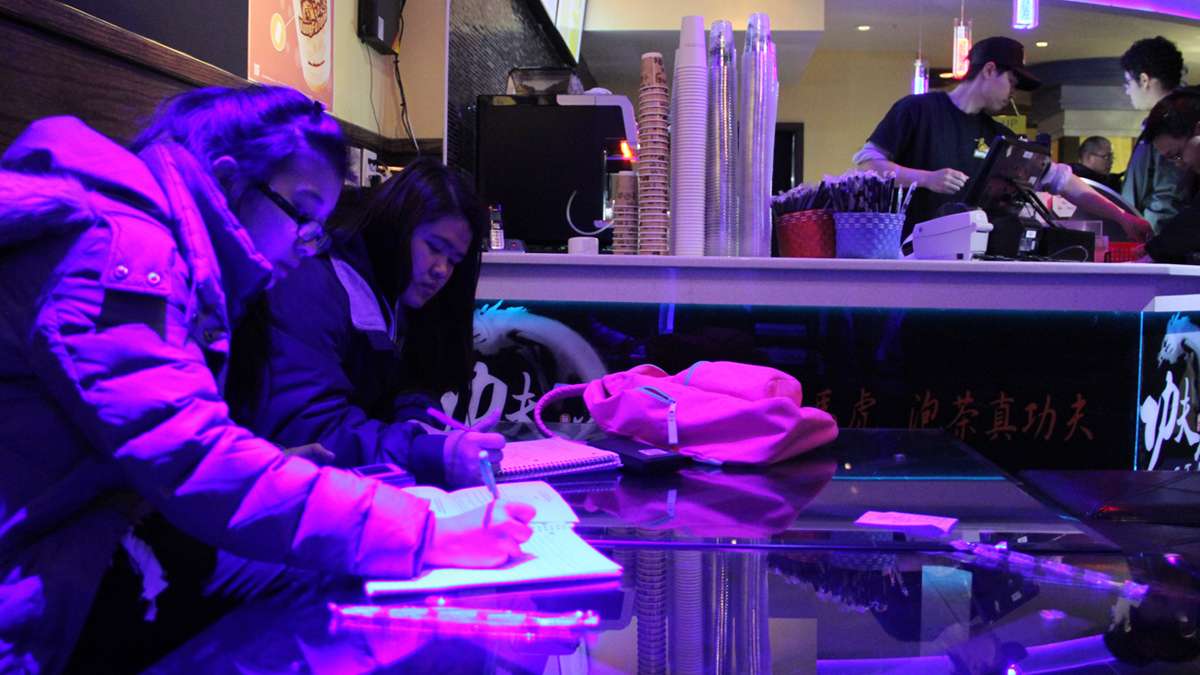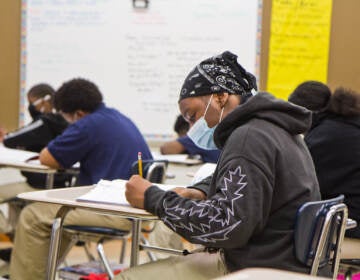Philly students still learning English fuel opt-out movement from standardized tests
ListenIn 2014, Pennsylvania parents opted about 1,000 kids out of the Pennsylvania System of School Assessment, or PSSAs. This year, 100 parents are opting out of the tests just at the Feltonville School of Arts and Sciences, a middle school in North Philadelphia.
In some cases, parents and teachers object to the tests for philosophical or political reasons. But many Feltonville parents have a more immediate concern: their kids can’t understand them.
Nomar Rodriguez, is one of these parents. Rodriguez and his family moved to Philadelphia from Puerto Rico in 2013. While his three sons — Nomar, Jomar and Keven — took some English classes in Puerto Rico, they are now all in English language learner (ELL) classes.
ELL students, by definition do not perform at grade level. But in Pennsylvania those students, along with special education students, are evaluated at grade level for statewide standardized tests.
Vici Smith, an English Language teacher at Feltonville, said for that reason the tests don’t give her valuable feedback for teaching students during the school year. “You know they’re not on level. What else do you need to know?”
Smith and other teachers at Feltonville have been vocal about parents’ right to opt-out under Pennsylvania law, sending letters home with kids and holding meetings. Philadelphia School District officials chastised those teachers, but Rodriguez said, through an interpreter, that he did not feel coerced into pulling his three sons out of testing.
“What they say about the teachers, it’s completely false,” he said. “The standardized tests are in English, therefore the tests are an obstacle for them. You know the kids have talents, but they can’t show that on the tests. It’s not fair.”
But he added, “If the tests were in Spanish I would let them take it.”
Opt-out rising
Rodriguez and the parents in Feltonville are joining a growing opt-out movement across the country. It includes liberals, libertarians and conservatives, who take issue with standardized testing a variety of different reasons.
Some parents in wealthy New Jersey suburbs who object to the Partnership for Assessment of Readiness for College and Careers (PARCC) tests believe those standards are too rigid, and that they waste time and money.
In Philadelphia, the opt-out movement mingles with existing debates about school funding and poverty in a district with a lot of high needs students.
Teachers, like Smith, have also said that the tests are demoralizing for students. In times of budget scarcity, low test scores can put schools on the top of the district’s list of schools to close or turn into charters.
For schools with lots of ELL students, low tests scores are a reality. Research from the National Center for Research on Evaluation, Standards and Student Testing has shown that ELL students perform 20 to 30 percentage points lower than average. That means schools with lots of ELL students also take a blow in their overall scores. Test scores may also contribute to teacher evaluations.
The pros of standardized testing
Standardized assessments do have a purpose. According to Nancy Potter, a staff attorney at the Education Law Center which has shared information about opting-out to parents, said “Testing is not an either or question.”
Potter said without testing, it’s difficult to track whether students — particularly in low-income areas — receive comparable resources and educational opportunities to their peers. In the past, this led to “serious civil rights abuses,” she said.
Other reasons for testing include the number of high school graduates who require remedial classes in college or can’t land even an entry-level job.
Chair of the Pennsylvania House’s education committee, Rep. Stan Saylor (R-York), said business leaders support testing, because, “The business community has been having trouble statewide to match up students with jobs.”
This sentiment echoed motivations behind the federal government’s Common Core overhaul, which called for more rigorous testing across the board.
According to Saylor, English language learners shouldn’t get any special treatment. “Maybe we delay testing you but you still have to take that test and be a part of that accountability.”
Still, Saylor said there’s a lot of debate in Harrisburg about which tests actually accomplish those goals.
Keystones: the capstone in Pennsylvania’s slate of standardized tests
Kai Teio is a 10th grader at Horace Furness High School in South Philadelphia. Last year, she failed her first attempt at the Keystone exams, part of Pennsylvania’s Core standard curriculum (the state’s take on the federal government’s Common Core). Keystone exams are the capstone in a series of tests orchestrated by the Core to evaluate students starting with tests in 3rd grade.
Beginning with the class of 2017, student have to pass Keystone tests in algebra, biology and literature or do a special project, to graduate.
“Some people they take and they fail,” said Teio, who worked with Asian Americans United to gather stories about testing and present them to Philadelphia’s City Council last year. According to Teio, some of her peers in the Chinese-American community who fail the test end up dropping out.
There’s research to support that some tests can impact graduation rates, but that some other tests can lead to less, not more, student engagement.
Religious exemptions for testing broadly defined
Pennsylvania law allows parents to opt their children out of statewide exams for “religious” reasons. What religion means under the law is left intentionally broad, said Potter, and that language is not unique to testing.
“Across the country, the law allows these exemptions for everything from the draft to vaccinations,” said Potter.
According to Potter, “the law is very clear that parents have a right to opt out of state assessments,” and there is no mechanism to challenge or interpret a parent’s reasoning. As for opting out of Benchmarks and other tests not handed down by the state, “The law is less clear,” said Potter. “But just because it’s not clear doesn’t mean that they don’t” have that right.
When teachers at Feltonville put that information in parents’ hands, they responded by opting out nearly one if five students from standardized tests.
That many opt-outs doesn’t just affect those students, it may actually throw off the scores for the entire school. Most schools and districts aim for a 95 percent completion rate on standardized tests, because any less and the accuracy of the exams starts dropping.
This makes Feltonville unique in Philadelphia. “We’re the first school in Philadelphia to make this happen,” said teacher Kelley Collings, a member of an activist caucus within the Philadelphia teachers union and one the people who shared information about opting out with parents. “There are a lot of questions that lawmakers and bureaucrats are going to need to deal with in a just way.”
Feltonville did get the school district’s attention. A spokesman said the District will do more this year to give all parents information about their right to opt their kids out of tests. And, the District will send that message in whatever language is spoken at home.
Thanks to Vanessa Marie Graber for providing Spanish-language interpretation for this article.
CORRECTION: An earlier version of the story misquoted how many students opted out of the PSSAs in 2014.
WHYY is your source for fact-based, in-depth journalism and information. As a nonprofit organization, we rely on financial support from readers like you. Please give today.







